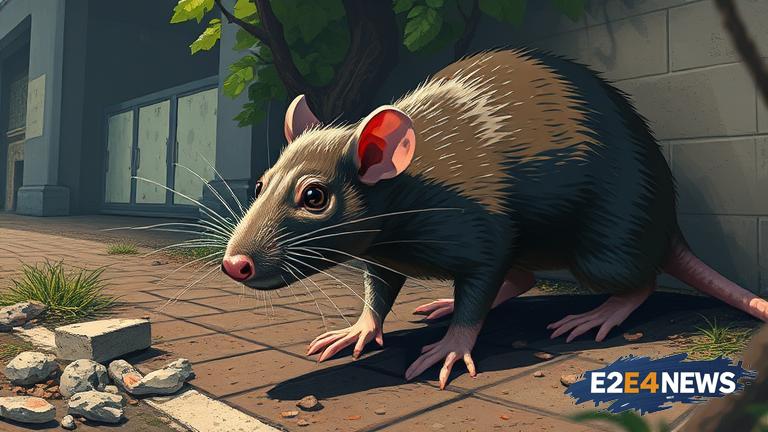The UK is experiencing a significant increase in giant rat infestations, with the summer heatwave and poor waste management being cited as major contributing factors. As the country basks in the warm weather, the rodent population is thriving, with many residents reporting sightings of the large rodents. The giant rats, which can grow up to 12 inches in length, are being spotted in homes, gardens, and public spaces, causing concern among the public. Experts warn that the heatwave is creating an ideal environment for the rats to breed and multiply, with the warm temperatures and abundant food sources allowing them to thrive. The UK’s waste management issues are also being blamed for the surge in rat sightings, with overflowing bins and litter-strewn streets providing a constant food source for the rodents. The problem is not limited to urban areas, with rural residents also reporting an increase in giant rat sightings. The rats are not only a nuisance, but also pose a health risk, with the potential to spread diseases such as leptospirosis and rat-bite fever. The UK’s environmental health officials are urging residents to take steps to prevent the spread of the rats, including properly disposing of waste and keeping homes and gardens clean. However, many residents are calling for more to be done to address the root causes of the problem, including improved waste management and increased funding for pest control services. The giant rat infestations are also having a significant impact on local businesses, with many restaurants and food establishments reporting a decline in trade due to the presence of the rodents. The UK’s pest control industry is experiencing a surge in demand, with many companies reporting a significant increase in calls to deal with giant rat infestations. Despite the efforts of pest control services, the problem shows no signs of abating, with many experts warning that the giant rat infestations could become a permanent feature of the UK’s landscape. The UK government has been criticized for its response to the crisis, with many calling for more to be done to address the underlying causes of the problem. The opposition has accused the government of being slow to respond to the crisis, and of failing to provide adequate funding for pest control services. The giant rat infestations are also having a significant impact on the UK’s economy, with many businesses reporting losses due to the presence of the rodents. The UK’s agricultural industry is also being affected, with many farmers reporting damage to crops and livestock due to the presence of the rats. The UK’s wildlife experts are warning that the giant rat infestations could have a significant impact on the country’s ecosystem, with the potential to disrupt the balance of the environment and cause long-term damage to the country’s biodiversity. The giant rat infestations are a major concern for the UK’s public health officials, who are warning that the rodents could pose a significant risk to human health. The UK’s NHS is bracing itself for a potential surge in cases of diseases spread by the rats, with many hospitals and healthcare services preparing for an increase in demand. The giant rat infestations are a complex problem that will require a coordinated effort to solve, with many experts calling for a comprehensive approach that addresses the underlying causes of the problem. The UK government must take immediate action to address the crisis, including providing adequate funding for pest control services and implementing effective waste management strategies. The public must also play a role in preventing the spread of the rats, by properly disposing of waste and keeping homes and gardens clean. By working together, it is possible to bring the giant rat infestations under control and prevent the long-term damage to the UK’s ecosystem and public health.





